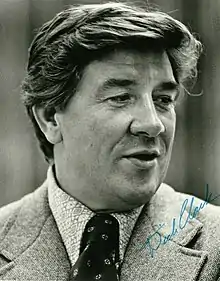Dick Clark (Iowa politician)
Richard Clarence Clark (September 14, 1928 – September 20, 2023) was an American politician who represented the state of Iowa in the United States Senate as a Democrat from 1973 to 1979.
Dick Clark | |
|---|---|
 Clark in the 1970s | |
| United States Senator from Iowa | |
| In office January 3, 1973 – January 3, 1979 | |
| Preceded by | Jack Miller |
| Succeeded by | Roger Jepsen |
| Personal details | |
| Born | Richard Clarence Clark September 14, 1928 Paris, Iowa, U.S. |
| Died | September 20, 2023 (aged 95) Washington, D.C., U.S. |
| Political party | Democratic |
| Spouse(s) | Jean Shirley Gross (divorced) Julie Kennett (m. 1977) |
| Children | 3 |
| Military service | |
| Branch/service | United States Army |
| Years of service | 1950–1952 |
Early life
Richard Clarence Clark was born on September 14, 1928, in Paris, Iowa. He graduated from Lamont High School in 1947 and enlisted in the U.S. Army, serving in Europe during the Korean War. Clark was educated at the University of Maryland, Wiesbaden and the University of Frankfurt from 1950 to 1952 during his military service. He completed his BA in 1953 at Upper Iowa University and his Master's in 1956 at the University of Iowa.[1] He then became a professor at Upper Iowa University and a Democratic Party volunteer, working to collect names, addresses, and phone numbers of party members with the goal of contacting them on election day to get them to the polls. This resulted in Democratic victories in an otherwise Republican area.[1]
This caught the attention of attorney John Culver of Cedar Rapids, Iowa, who enlisted Clark to help run his congressional campaign in 1964. After their victory, Clark became Culver's administrative assistant, and the pair modernized the Iowa Democratic Party's grassroots efforts in the state, building up a sophisticated voter turnout organization that progressed from names on index cards to computerized databases.[1]
In 1971, Culver was contemplating running for the U.S. Senate. He dispatched Clark to travel the state to set up infrastructure for a potential campaign. But in early 1972, Culver decided that defeating entrenched incumbent Republican Senator Jack Miller was impossible and bowed out of the race. With the infrastructure set up and no other Democratic candidate in the race, Clark entered it himself.[1]
U.S. Senate

Throughout the campaign, polls showed Clark trailing Miller by lopsided margins. A critical part of Clark's campaign was his 1,300-mile (2,100 km) walk across the state to gain publicity.[2] He won in an upset, with 662,637 votes (55%) to Miller's 530,525 (44%). American Independent Party candidate William Rocap received 8,954 votes (1%). In 1974, Clark was joined by Culver, his former boss, who rode to victory because of the Republican Party's unpopularity in the wake of the Watergate scandal.
Clark was a very liberal senator, consistently ranked among the most liberal during his tenure.[3] He served on the Senate Foreign Relations Committee and chaired the Subcommittee on Africa, developing considerable expertise on the crisis in Angola. In 1976, he authored the Clark Amendment, which barred aid from the U.S. government to private groups engaged in military or paramilitary operations in Angola.
Clark ran for reelection in 1978 against Republican Roger Jepsen. Because of his efforts against the apartheid government in South Africa, Jepsen taunted him as "the Senator from Africa".[4] In a nationally poor year for Democrats, Clark lost the seat by a narrow margin. President Jimmy Carter then appointed him to be Ambassador at Large and United States Coordinator for Refugee Affairs in 1979; later that year, Clark resigned from his position to join the presidential campaign of Ted Kennedy, with whom Clark had served in the Senate, against Carter.[5] In 1980, he became a senior fellow at the Aspen Institute for Humanistic Studies.
As a senator, Clark served on the Committee on Agriculture, Nutrition, and Forestry, the Committee on Environment and Public Works, and the Committee on Small Business and Entrepreneurship.
Personal life
Clark married Julie Kennett in 1977. He had three children from his previous marriage to Jean Shirley Gross, which ended in divorce.[6]
Clark died at his Washington, D.C., home on September 20, 2023, six days after his 95th birthday. Upon his death, Daniel J. Evans became the last living former U.S. senator born in the 1920s.[6]
References
- Harrington, Jerry. "Dick Clark's walk across Iowa earned him a U.S. Senate seat 50 years ago". Iowa History Journal. Retrieved October 30, 2022.
- "The time a staffer leapfrogged his boss to a U.S. Senate seat", New Jersey Globe, September 14, 2021, retrieved October 30, 2022
- "CLARK, Richard Clarence (Dick) (1928-)", VoteView, retrieved October 30, 2022
- Rogers, David (December 26, 2013). "A Nelson Mandela backstory: Iowa's Dick Clark". Politico. Retrieved October 3, 2014.
- Hovey, Graham (October 31, 1979). "CARTER LOSES CLARK TO KENNEDY'S CAMP". The New York Times. ISSN 0362-4331. Retrieved September 21, 2023.
- Gruber-Miller, Stephen. "Dick Clark, a Democrat who won a US Senate seat by walking across Iowa, dies at 95". The Des Moines Register. Retrieved September 20, 2023.
